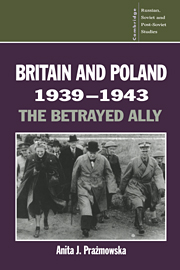Book contents
- Frontmatter
- Contents
- Preface
- Map
- 1 The formation of the Polish government-in-exile: ideology and war plans
- 2 Britain and German expansion in Eastern and South-eastern Europe
- 3 Britain's only fighting ally
- 4 Britain, Poland and the Soviet Union: June–December 1941
- 5 1942, year of disappointments
- 6 The illusion of an alliance ends
- 7 1943, the end of Polish–Soviet co-operation
- Conclusion
- Notes
- Bibliography
- Index
- Titles in the series
Preface
Published online by Cambridge University Press: 29 September 2009
- Frontmatter
- Contents
- Preface
- Map
- 1 The formation of the Polish government-in-exile: ideology and war plans
- 2 Britain and German expansion in Eastern and South-eastern Europe
- 3 Britain's only fighting ally
- 4 Britain, Poland and the Soviet Union: June–December 1941
- 5 1942, year of disappointments
- 6 The illusion of an alliance ends
- 7 1943, the end of Polish–Soviet co-operation
- Conclusion
- Notes
- Bibliography
- Index
- Titles in the series
Summary
I would not wish to deny that I have come to this subject because of its deeply emotive nature. Most current analysis of contemporary Polish history seems inevitably to founder on the question of why it was that Poland neither obtained recognition for her suffering and sacrifices during the Second World War nor secured the return of her territories after the war. Thus the search for those who are in some way responsible for this disaster is a common theme in political and historical debates. This work has been my attempt to face some of the most puzzling and painful events in recent Polish history. I do not wish to seek those responsible for failures.
In this enquiry into the nature of Polish–British relations during the years 1939–1943, I did not find within the two governments' war aims areas of common concern going beyond their obvious wish to see Germany defeated. During the inter-war period, Polish territorial and political objectives had been different from those of the British government. While I do not claim that major issues separated the two from the first day of the war, I have found that little united the two Allies. The Polish government-in-exile set out for itself a programme of establishing for Poland a right at the end of the war to sit at the negotiating table as one of the key wartime Allies. The means of achieving this was to make a vital and credible military contribution to the joint war effort.
- Type
- Chapter
- Information
- Britain and Poland 1939–1943The Betrayed Ally, pp. ix - xiPublisher: Cambridge University PressPrint publication year: 1995

